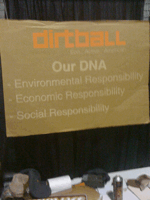
I’m still wandering the aisles at the Action Sport Retail Show, and once again I am impressed! Dirtball Fashion (http://dirtballfashion.com) insteading of wasting energy, oil- reused cardboard, made their back-drop sign from cardboard. It was eye-catching and I loved it! Not only that each Dirtball T-shirt is made from bottles! Plus for every Dirtball Tshirt sold they donate $1.oo to a charity of choice.
Dirtball Tee are American made and all products are sourced within 200 miles of Dirtball’s home office. Plus their goal is Zero Impact and Zero Waste.
They make recycled T’s, hats, pants, jeans, fleece, soft shells, outerwear, skatedecks and snowboards and shorts, quite a diverse offering. Men, Women and Childrens clothing are available.
You can also visit them on Twitter, myspace, facebook, Loop’d, YouTube, FuelTV.-
Facts on Dirtball Material (from website)
Each Dirtball T-shirt contains 2 – 16oz. water bottles.
Dirtball’s current short “The Dirt Short” – is made out of 10 16-ounce bottles, which have been repurposed to create a high-quality polyester fabric. The shorts are not only recycled, but recyclable. Once a pair is worn out it can be returned to Dirtball Fashion where it gets sent back to their North Carolina headquarters to be re-spun back into polyester fiber. To thank the customer for their environmental friendliness, the customer will receive 20% off a future on-line purchase. No other clothing company has a recyclable short.
- All shirts printed with water based ink.
- 2 million plastic bottles are used in the U.S. every 10 minutes.
- 51 billion plastic bottles go into U.S. landfills every year.
- 3 billion plastic bottles recycled is the equivalent of saving over half a million barrels of oil and eliminating 400,000 tons of harmful air emissions which contribute to acid rain, global warming and smog.
- Recycling pre-consumer cotton helps to keep 5 billion pounds of waste from going into U.S. landfills.
- Buy buying fabric made with recycled cotton, you are helping to reduce the effects of insecticides and other chemicals have on our soil, air and water tables.
- It takes 1/3 lb of agricultural chemicals to produce 1 cotton t-shirt.
- Cotton requires 22,000 liters of water to produce 1 kilogram of cotton lint making it the most fresh water intensive crop in the world.
- Cotton uses some 25% of the world’s insecticides, even though it is grown on 2.4% of the world’s land. Cotton consumes 60% of the insecticides applied in the U.S.
- Recycled cotton doesn’t take the manual labor or land use that is required for conventionally grown cotton. It takes twice as much land usage to produce the same amount of organic cotton as conventionally grown cotton.
- The majority of the organic cotton is produced in Asia and shipped to the U.S. offsetting any environmental benefits due to the transportation resulting carbon footprint.
